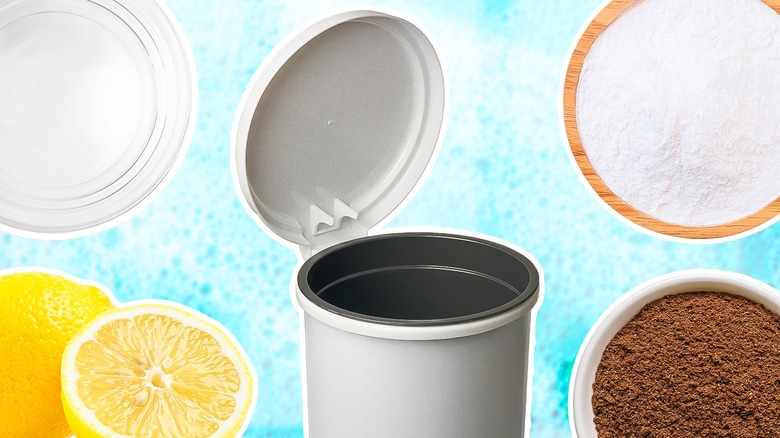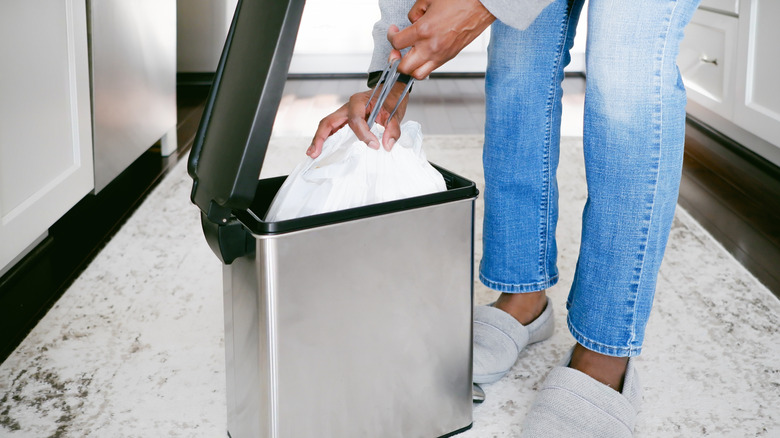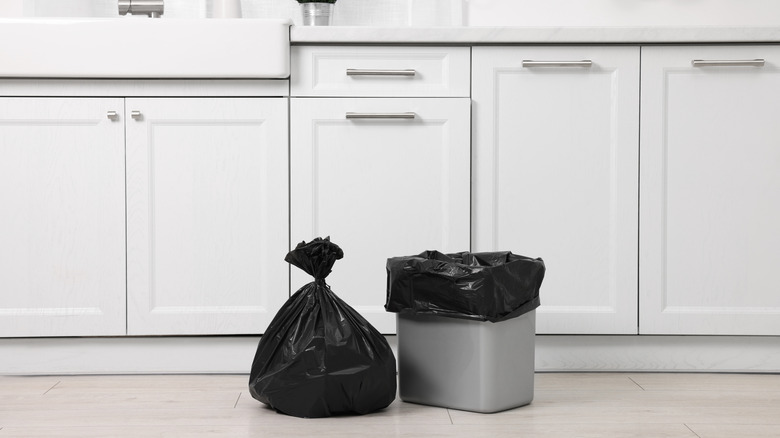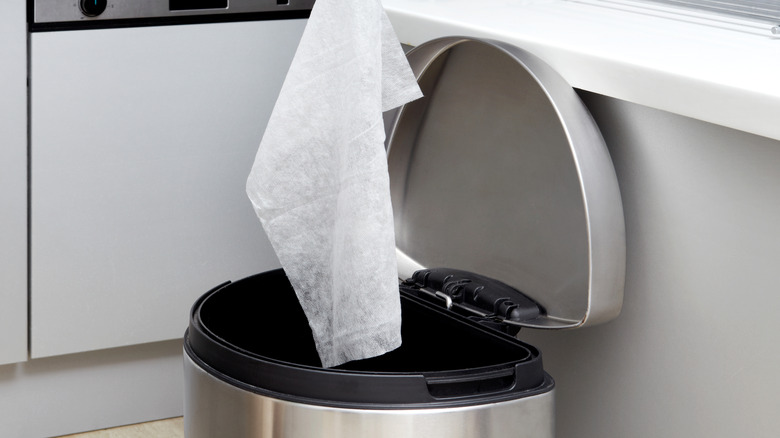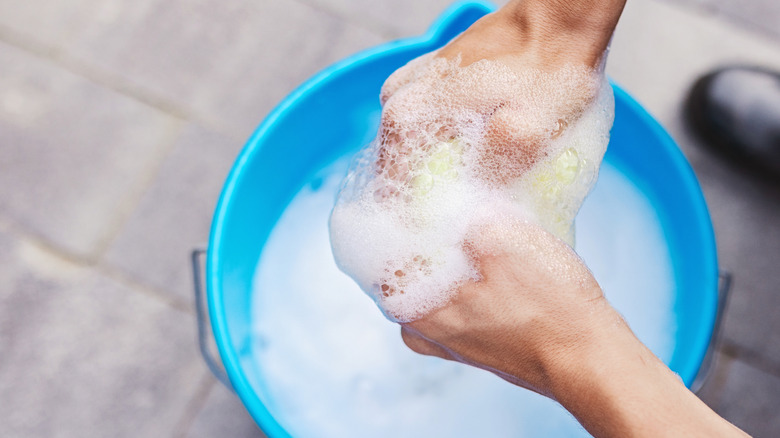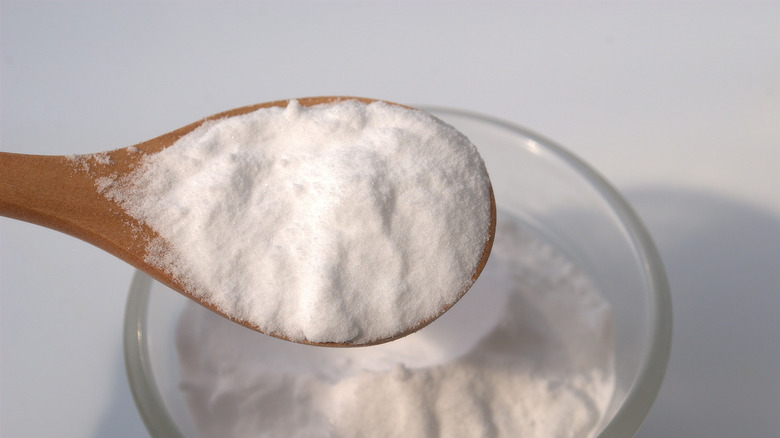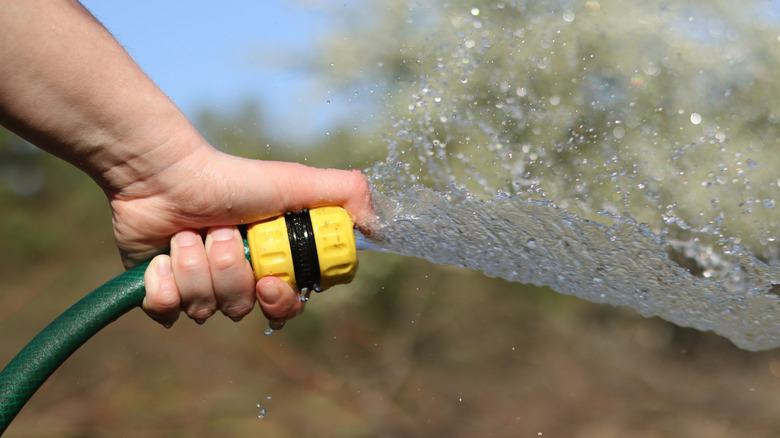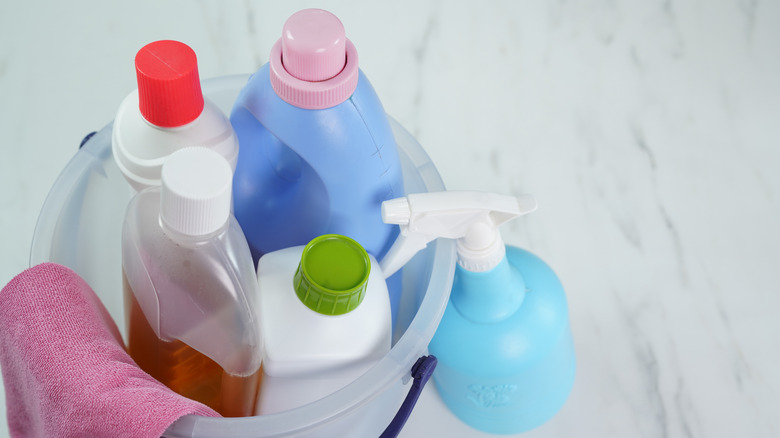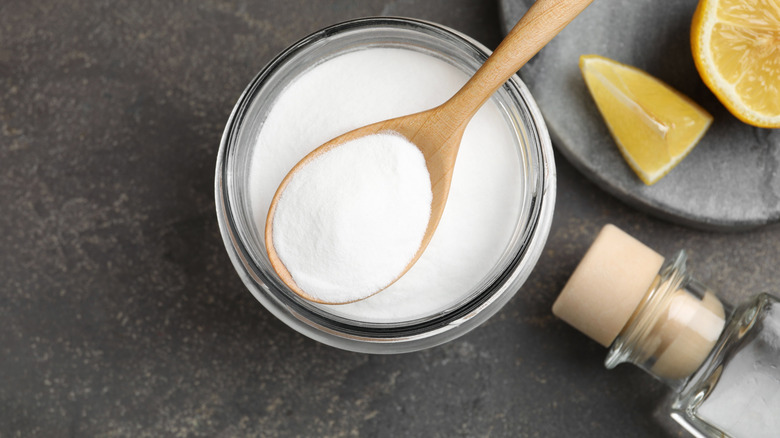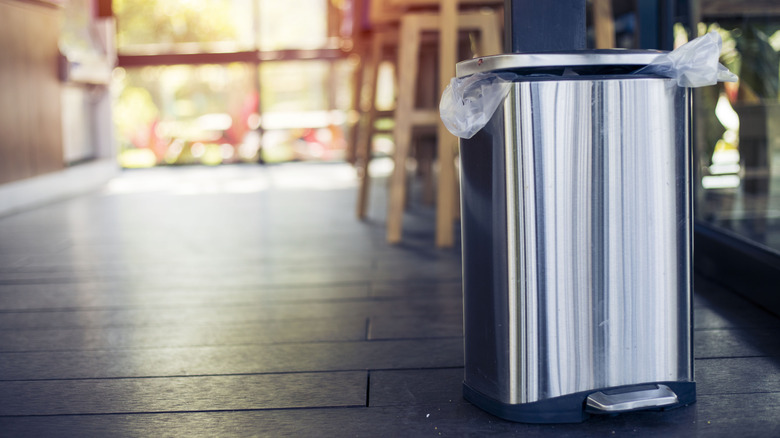12 Tips For Keeping Your Kitchen Garbage Can Clean
How often do you wash your bedsheets? What about vacuuming the carpet? And scrubbing the kitchen sink? Most of us clean these pretty regularly because if we didn't, it would be noticeable. But something that folks often push to the wayside is cleaning their kitchen garbage can because it's not the most desirable job. Unfortunately, just taking out the trash doesn't always resolve a smelly can. That being said, cleaning your trash can doesn't have to be a drawn-out and laborious task, especially when you have some helpful tips to guide you through the process.
After running a commercial kitchen that frequently scored 100 on our health inspections, I learned all about the nitty-gritty of keeping every aspect of a kitchen clean — including the trash can. I've found that although the cans are often overlooked, they can be a huge source of grime. Don't let a dirty can stink up your kitchen; instead, stay on top of the mess and follow a few of these tips and tricks to ensure a fresh-smelling kitchen all the time.
Buy a stainless steel can
For those really hoping to rid their kitchen of that stinky trash can smell, it may be time to throw the whole thing out — bin and all. If you've been using a plastic bin, that might be part of your problem. Plastic is porous and absorbs and retains smells more than a material like stainless steel. So no matter how hard you scrub that plastic and bleach it, it will always smell like a combination of cleaning products and rotting food. In addition, you can't use a tough scrubber to wash plastic because it will produce micro-scratches, which just give bacteria another place to hide and thrive. Stainless steel is tough and ready for a solid scrub-down, so don't hold back.
As you're shopping around for that new dream bin, target stainless steel trash cans. Not only will they prevent odor absorption, but they are also easier to clean and more durable. Yes, plastic is cheaper. But in the long run, your stainless steel bin will outlast any plastic one, smell better, and have a classier look. Although people tend not to invest in their trash cans, it's a must, especially if it's going to sit outside of a cabinet in the open. Stainless steel is practical, aesthetically pleasing, and a no-brainer.
Use a smaller bin
This tip for keeping your kitchen garbage can smelling fresh is fairly simple, but does require more work in the long run. How often do you empty the trash in your kitchen? For some of us, it's daily; for others, a few times a week. The frequency depends on several factors, including how much trash you produce, whether you recycle and compost, how many folks live in your household, and how big your trash can is. The more you take out your trash, the less likely it is to leak or stink up your kitchen. If you don't empty your trash every day or every few days, then you should consider getting a smaller bin.
This may not sound appealing, but hear me out. The more you empty your trash bin, the less frequently you'll have to deep clean it. Don't give your trash a chance to stink and rot; nip it in the bud. Growing up, we had two kitchen trash cans: one small bin for food items and a larger one for paper towels, plastic wrap, and other non-perishable garbage items. These smaller bins can hide under your sink or sit right out in the open.
Compost separately
One of the best ways to keep your trash bin odor-free is to reduce the cause of the odor — like pesky food scraps. One way to do this is to have a separate bin for compost. Compost bins are usually much smaller, and get cleaned and dumped more frequently than a standard rubbish bin, ensuring less opportunity for food to break down and smell bad.
Although it may seem like composting isn't for everyone, there are plenty of ways to do it, and one of them may work for you. You don't have to have raised beds or live on a farm to compost your food scraps. In fact, some areas even have compost pickup, which is a part of the local waste management department. Other areas have private companies that will haul away your compost and leave you with clean bins. You might even be able to find a local gardener or farmer who would pay you for that precious, stinky rotting food.
Worried about that compost bin smell? Keep it outside or in the freezer to avoid falling into the same trap as your regular stinky kitchen trash can. If you're really unable to compost, consider keeping your food scraps in a bin in your freezer, and then emptying it once a week on trash day. You can even try to repurpose kitchen scraps instead of throwing them away to reduce the amount of rotting food in your trash bin.
Wipe it down often
If you wipe your kitchen surfaces and sink down daily, you probably know how important it is to keep those areas clean so that you don't have to use as much elbow grease during your deep cleans. The same goes for your trash bin. Although it deserves a wipe at least once a day, you don't have to make a whole production of it. If you dry your hands with a paper towel or use one to clean up splashed water around your sink, try using that towel to wipe down your bin before tossing it out. Swipe around the bin's lid and rim to prevent any garbage juice from hardening and sticking. Even wiping off dust is easy to do, and it uses paper towel that would otherwise be thrown away.
Once a week, consider using a multi-surface cleaner instead of just water to wipe the outside of the bin and the inside of the lid. It shouldn't take you more than a minute or two to do, and this upkeep will save you time in the future. Wipe both the exterior and interior and let it dry before adding a new liner. This is one of the simplest things you can do on a weekly basis to keep your trash can clean and ensure a fresh-smelling kitchen all the time.
Deep clean it regularly
You don't have to say it out loud, but be honest with yourself: How often do you deep clean your trash bin? Not to go all Monica Geller on you, but you're probably not doing it enough. Deep cleaning allows you to kill bacteria and prevent rotting food from hiding in nooks and crannies that will inevitably break down and begin to wreak. Deep cleaning can't be done with a simple wipe down. You may want to even consider soaking your bin.
Start by wiping off any big chunks of grime and dust. Next, you're going to want to use an all-purpose cleaner, or vinegar if you're not a Clorox family. Anything that kills the odor-causing molds, yeast, and bacteria will do. Grab a sponge or scrub brush and a bucket of suds and get to work. Get on your hands and knees, and use a little elbow grease. Ideally, you should be doing this with the change of each season, about four times a year. But if you're not doing it at all now, start with one to two times a year and work your way up. Anytime you notice that your bin has a lingering smell, that's also a great indicator that it's time to pull out the rubber gloves. The more you clean it, the less likely you are to need frequent deep cleans.
Absorb that smell
Stinky garbage is a fact of life. No matter how much you clean, compost, and spray, food waste smells bad. To stay one step ahead of the game, consider using deodorizers to absorb the smell. You can get charcoal deodorizers at stores like Home Depot and Walmart. There are also simple ways to make your own, and you might have even used some of these techniques before when trying to eliminate bad fridge smells.
Start with an old, yet reliable technique and place baking soda in tin foil. You can also leave it in its box as long as it's opened, and let it hang out at the bottom of your bin. You might want to tape it to the side so it doesn't tip over and make a mess, and you'll have to toss the box once you're ready to switch out the baking soda, as it will absorb smell as well. Another natural way to absorb odors is with salt and coffee. The nitrogen in coffee grounds absorbs nasty smells, and since you can use dried, spent coffee grounds, there's no need to spend money on fresh ones.
Salt has a neutral pH and will neutralize odors in the air and absorb moisture, helping reduce bad kitchen smells. For best results, place the tin foil pouch of coffee grounds and salt at the bottom of your trash can.
Use essential oils to mask the smell of your trash can
If you don't have time to shower, what do you do? In moments of desperation, most of us can probably admit to using perfume or fragrant deodorant to mask the smell. After all, why do you think deodorant is scented? It turns out you can do the same thing with your trash can by using scented bags. But if you have young children, pets, or just don't like scented products, I have a better solution for you.
Essential oils are a wonderful way to add a pleasant aroma to your kitchen. Dab a paper towel or rag with essential oils. Leave it at the bottom of your bin, swapping it out each time you empty the trash or when the smell starts to fade. I like to use lemon oil for the kitchen, peppermint for the bathroom, and lavender for the bedroom, but follow your nose and choose the scent that works best for you.
Use your garden hose
Take that mess outside! Nobody wants to clean their trash can in the bathtub or sink. It's gross, no matter how you slice it. If you're lucky enough to have a hose and a driveway or backyard, then you're golden. During those deep cleans, your garden hose is going to come in handy. Bring your bin outside, set that sprayer to the max, back up, and blast away.
Drizzle some eco-friendly soap (so it won't harm your lawn) in the bin, and use the hose to circumvent having to roll up your sleeves and dive headfirst into a smelly vat of garbage juice. If you're using bleach, you'll want to avoid letting runoff from your cleaning project go into the grass or gardens. Just use a very small, diluted amount of bleach – about 1 teaspoon of bleach per cup of water – or opt for vinegar (but not both, as we know this creates chlorine gas). The hose method is superior because you can also let it air-dry outside, and you can even get your kids to take turns firing away at the dirty bin with the hose.
Kill the bacteria in your can with bleach
Not everyone is a fan of cleaning with bleach, as it can be harmful if used improperly. However, it's a great tool to help you clean out your trash can. Bleach's main purpose is to kill bacteria, which is one of the goals of a trash can deep clean. If possible, wipe down your trash can with bleach once a month, which should only take two to three minutes. Save the elbow grease for the deep clean.
You can either buy a bleach-based cleaning spray or mix bleach with water and use a spray bottle to ensure you're getting it in all of the nooks and crannies. Spray it and use a rag or paper towel to wipe it down both inside and out before letting it dry without a bag inside. A bacteria-killing substance like bleach will help you sanitize, not just clean, your trash can, which helps keep your kitchen safe. If you have children or pets at home, try to use bleach when everyone is outside. Open the windows, turn on your fans, and let that air circulate. Bleach should not be mixed with other chemicals, so use it solo or dilute it with water.
Use homemade, non-toxic cleaners
Luckily, for those who don't love the idea of harsh chemical cleaners, there are many other ways to kill bacteria in your trash can. In fact, you can stock your entire house with natural, homemade cleaners that really do get the job done. One of the best-smelling ways to clean your kitchen is with lemons. To clean a stainless steel trash can, cut one in half, coat the cut side with baking soda, and rub it on the surface of the bin. Really scrub it if you must, and then wipe it down with a cloth. This should leave your stainless steel streak-free and smelling fresh.
You can go one step further and add vinegar to the lemon juice and baking soda mixture, or leave a lemon peel in your bin to promote a fresh citrus scent. Alternatively, skip the lemon entirely and stick with the tried-and-true combo of baking soda and vinegar. This duo will cut through grease, kill odor-causing bacteria, and deodorize your bin all at once. Consider mixing the two in a spray bottle, giving your bin a full spray-down, and then wiping it clean. Be sure that the trash can is fully dry before lining it with a new bag.
Keep stainless steel streak-free
"Clean" means more than just a fresh smell and fewer bacteria. A clean space should also look tidy and neat when you've finished cleaning it. Leaving massive streaks across your stainless steel trash can is not satisfying, even if it's technically "clean." If you notice your cleaning products are leaving behind a sheen, then it's time to make your own streak-free mix that ensures your stainless steel can will sparkle. Who says garbage can't be beautiful?
You can use a mixture of olive oil and vinegar to clean the outside of your stainless steel garbage can. This magical cleaning solution works on any of your stainless steel appliances. Mix the two ingredients using a 1-to-1 ratio, spray the outside of your can, and use a microfiber cloth (and those muscles) to buff the outside. The acid in the vinegar helps break down the grime, while the oil leaves that shiny, streak-free coating. Don't worry about the vinegar smell, once it evaporates, your kitchen will be left smelling fresh. Voilà! No more streaky stainless steel trash bins.
Find a way to motivate yourself to clean your trash can
Okay, so now you have all the tips for keeping your kitchen garbage can clean. But something I can't teach you is motivation. Pumping yourself up to go to the gym is one thing, but to dive headfirst into your trash can is another. Firstly, upkeep, upkeep, upkeep! Don't put it off, because the longer you wait, the more work you make for yourself later. You can watch some inspiring trash cleaning videos TikTok or Instagram too, because sometimes watching someone else clean can be satisfying and motivating. Lastly, if you just can't get yourself to make the plunge, try setting a timer.
The Pomodoro method of cleaning is made for procrastinators. Simply set a timer for 10 minutes, clean hard, and take a five-minute break between each cleaning interval. Your trash can shouldn't take longer than a few minutes to wipe down your bin, and no more than 10 minutes to deep clean it. Having an end in sight can make a huge difference and help keep that motivation pumping through your veins. Take advantage of your energy spurts, sniff the bin to kick yourself into high gear, grab some gloves, and get scrubbing. When in doubt, set a reminder in your calendar for deep cleans, and remind yourself every time you wash out your sink to give the garbage bin some attention, too.
